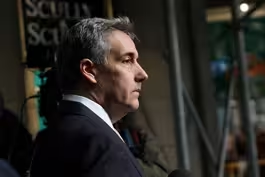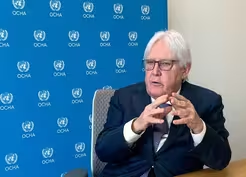
Biden blocks GOP access to special counsel interview audio
Clip: 5/16/2024 | 3m 49sVideo has Closed Captions
Biden uses executive privilege block GOP access to special counsel interview audio
President Biden used executive privilege to deny House Republicans access to audio from his interview with special counsel Robert Hur. The October 2023 interview centered on the president’s handling of classified documents. Republicans requested the audio and planned to hold Attorney General Garland in contempt of Congress for failing to provide it. Amna Nawaz discussed more with Carrie Johnson.
Problems playing video? | Closed Captioning Feedback
Problems playing video? | Closed Captioning Feedback
Major corporate funding for the PBS News Hour is provided by BDO, BNSF, Consumer Cellular, American Cruise Lines, and Raymond James. Funding for the PBS NewsHour Weekend is provided by...

Biden blocks GOP access to special counsel interview audio
Clip: 5/16/2024 | 3m 49sVideo has Closed Captions
President Biden used executive privilege to deny House Republicans access to audio from his interview with special counsel Robert Hur. The October 2023 interview centered on the president’s handling of classified documents. Republicans requested the audio and planned to hold Attorney General Garland in contempt of Congress for failing to provide it. Amna Nawaz discussed more with Carrie Johnson.
Problems playing video? | Closed Captioning Feedback
How to Watch PBS News Hour
PBS News Hour is available to stream on pbs.org and the free PBS App, available on iPhone, Apple TV, Android TV, Android smartphones, Amazon Fire TV, Amazon Fire Tablet, Roku, Samsung Smart TV, and Vizio.
Providing Support for PBS.org
Learn Moreabout PBS online sponsorshipAMNA NAWAZ: President Biden today used executive privilege to deny House Republicans access to audio recordings from his interview with special counsel Robert Hur.
The October 2023 interview centered on the president's handling of classified documents.
Hur's report described the president as a -- quote -- "sympathetic, well-meaning, elderly man with a poor memory."
House Republicans, including Representatives Jim Jordan and James Comer, requested the audio and planned to hold Attorney General Merrick Garland in contempt of Congress for failing to provide it.
Earlier today, Garland addressed the matter.
MERRICK GARLAND, U.S. Attorney General: There have been a series of unprecedented and frankly, unfounded attacks on the Justice Department.
This request, this effort to use contempt as a method of obtaining our sensitive law enforcement files is just the most recent.
AMNA NAWAZ: Following it all is NPR's Carrie Johnson, who joins us now.
So, Carrie, House Republicans already have transcripts of the interviews provided by the White House.
What's their argument for why they need the actual audio, and why was that request denied?
CARRIE JOHNSON, NPR: Jim Jordan and the House Judiciary Committee signaled that he simply doesn't trust the White House in this transcript.
He wants to see what Biden said and hear what Biden said for himself.
And he said more about the president's state of mind and his memory issues could become more clear if he's able to hear the audio.
The Justice Department and the White House seem to be signaling that they have already made extraordinary accommodations.
They have given written transcripts.
They have given House Republicans correspondence between the Justice Department and Biden's White House counsel and his private lawyers and a couple of classified documents as well.
And they are drawing a line that enough is enough and that House Republicans do not need to hear these audiotapes at this time.
AMNA NAWAZ: But President Biden had insisted that Hur had mischaracterized the interviews when the transcripts came out, but now they won't release the audio.
Doesn't that put the White House in a difficult position here?
CARRIE JOHNSON: It does to some extent, but I think the White House may be making a calculation that it's better to receive criticism on that point than to try to release the audio, which, as the White House counsel said, could then be sliced and diced and chopped up as part of campaign ads before the November election.
AMNA NAWAZ: And what about this move, as we reported earlier, to hold Attorney General Merrick Garland in contempt of Congress for not providing that audio?
Where does that stand now?
CARRIE JOHNSON: The White House has asserted executive privilege, but the House Judiciary Committee went right ahead along party lines this afternoon and voted to hold Merrick Garland, the attorney general, in contempt.
We expect a similar vote overnight by the House Oversight Committee.
Then, of course, Amna, that whole issue has to get on the House floor.
The full House would have to vote.
A majority of the full House would have to vote in order to hold Merrick Garland in contempt.
But now that the White House has asserted executive privilege, Merrick Garland basically has a legal shield, a legal defense, and so he couldn't be prosecuted for this anyway.
AMNA NAWAZ: Carrie, House Republicans' efforts to impeach the president have stalled.
Their attempt to impeach the homeland security secretary failed.
Do they now have their sights set on Merrick Garland?
CARRIE JOHNSON: Merrick Garland seems to think so.
In his remarks to reporters this morning at the Justice Department, he cast this move as yet another in a series of what he called unfounded attacks on the Justice Department, federal agents and prosecutors, Republican attempts to defund the special counsel Jack Smith, who has secured two indictments against former President Donald Trump.
That, Merrick Garland says, is wrong, and he's going to defend the institution and the people who work there.
AMNA NAWAZ: That is NPR's Carrie Johnson joining us tonight.
Carrie, thank you so much.
CARRIE JOHNSON: Thank you.
Cohen testifies for 3rd day in Trump hush money trial
Video has Closed Captions
Clip: 5/16/2024 | 4m 43s | What happened during Michael Cohen's 3rd day of testimony in the Trump hush money trial (4m 43s)
ER doctor reflects on treating trauma, preventing violence
Video has Closed Captions
Clip: 5/16/2024 | 5m 58s | Emergency room doctor reflects on treating trauma and preventing violence in new book (5m 58s)
FDIC audit reveals toxic culture, chair faces calls to quit
Video has Closed Captions
Clip: 5/16/2024 | 6m 46s | FDIC chair faces calls to resign after audit details toxic work culture at agency (6m 46s)
The lasting legacy of Brown v. Board and ongoing challenges
Video has Closed Captions
Clip: 5/16/2024 | 9m 12s | The lasting legacy of Brown v. Board and ongoing education challenges (9m 12s)
Outgoing UN humanitarian chief on handling global crises
Video has Closed Captions
Clip: 5/16/2024 | 8m 24s | Outgoing UN humanitarian chief on handling one of the worst years for global crises (8m 24s)
U.S. families working to save Gaza child with rare disorder
Video has Closed Captions
Clip: 5/16/2024 | 6m 17s | American families working to evacuate Gaza child facing rare medical disorder (6m 17s)
Providing Support for PBS.org
Learn Moreabout PBS online sponsorship
- News and Public Affairs

FRONTLINE is investigative journalism that questions, explains and changes our world.

- News and Public Affairs

Amanpour and Company features conversations with leaders and decision makers.












Support for PBS provided by:
Major corporate funding for the PBS News Hour is provided by BDO, BNSF, Consumer Cellular, American Cruise Lines, and Raymond James. Funding for the PBS NewsHour Weekend is provided by...





